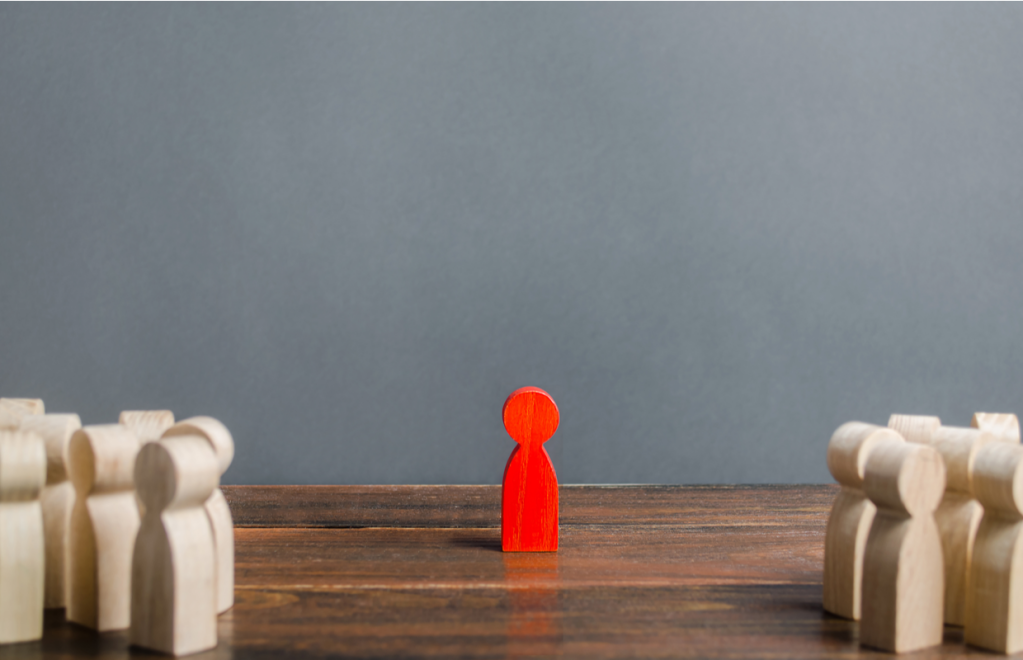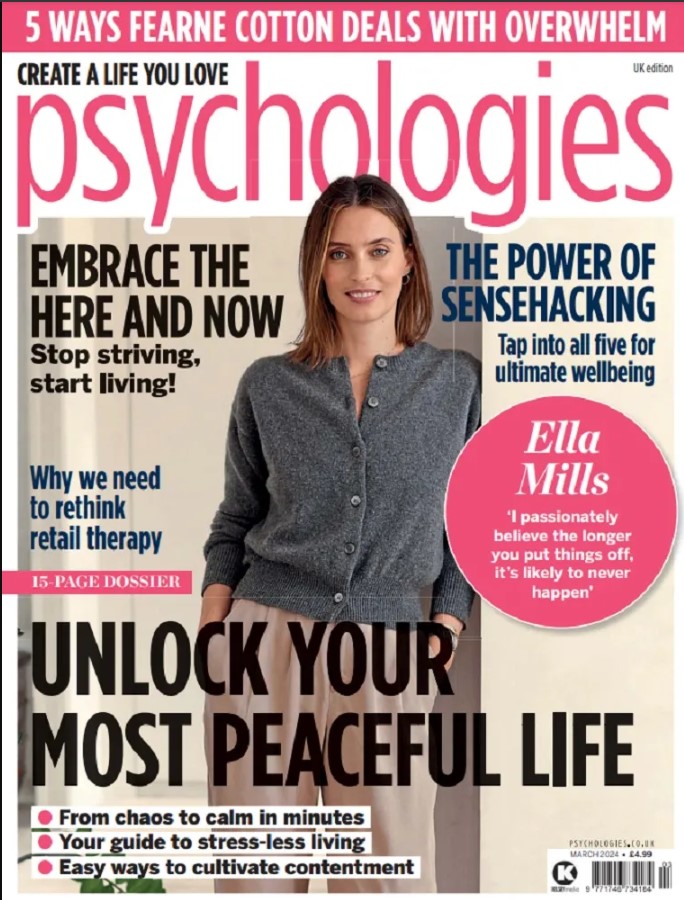Mindfulness practice for loneliness and past hurts
Do you struggle with painful emotions from your past, that get in the way of your life now? Find out how comedian turned psychotherapist, Ruby Wax overcame the pain of past and present loneliness with mindfulness, introspection and a little vulnerability...

Long before discovering mindfulness, loneliness used to rule my life. It has motivated all my decisions and shaped who I’ve become, because I was always alone when I was young. I thought the reason no one liked me was because my parents were weird and, clearly, I was a carrier of that weirdness and no one wanted to catch it.
Every day, since childhood, my main motive has been to be accepted, to ensure I wouldn’t have to be alone. I made desperate attempts to glue myself onto gangs or cliques in high school, but was always rejected. It didn’t help that my father nicknamed me ‘sad sack’, which means loser in any language.
Then, around 16, a miracle happened. I don’t recall how it happened, but I saw Joan Rivers on television and within 24 hours, I had turned myself from a loser into America’s hottest comedian, actress, writer, producer and television host all in one. I was suddenly channelling Joan Rivers and, beyond my control, her lines were coming out of my mouth. Overnight.
I could never switch ‘Joan’ on in front of my parents, as they had locked me into the label ‘sad sack’. But outside the house, I was going full Vegas at parties, in the playground, in the loo. I became her, though strangely when I met Joan later in my life, not even Joan was Joan – she was vulnerable, a little jittery and unsure of herself. A made-up person, just like me.
Running away from my loneliness
By the end of high school, my parents were taking me to career counsellors, asking them what I could possibly become with so little going for me. They assumed that with my grades, I would amount to nothing, so my dad promised me that if I still hadn’t landed a job at 35, he would buy me a small linen shop to run. This is why, when I escaped to the UK, I pulled out the big guns and went straight into television. No one could stop me, because that fear of a linen shop was so strong.
I didn’t even need a script. I was the script, having rehearsed funny lines since my teens. From then on, I was off at the races, building up a persona like plates of armour around me. I made up for the fact that I didn’t fit in with any group by surrounding myself with people who seemingly liked me, mainly for being funny. It wasn’t quite the same feeling as belonging, but it wasn’t a bad stand-in for an isolated childhood.

Lonely in a room full of people
I’m not saying you should feel sorry for me. Why should you, when I was the channeller of Joan Rivers? But it turns out that no matter how many people you’re performing in front of, you might as well be in the Sahara because you have absolutely no feeling of connection with anyone. How can they connect when you’re hiding behind some persona that’s machine-gunning them with schtick? If you’re not revealing the real you, why should they? And who is the real you anyway?
You get so used to bending into shapes to make people like you, you forget to figure out where you are in all the gymnastics. Without insight, you never know what you need to be happy or make others happy. So the gap between what you’re putting out to feel less lonely, and what people are hearing, is dead space.
Hiding behind a tough front to deal with loneliness
I think many of us spend lifetimes building up a tough front to show the world how well we’re coping even when we’re dying inside. It’s such a waste of time because, in the end, no one really likes you for how impressive you are. They may admire you and throw you a dinner party, but they don’t necessarily want to hang out with you.
We all have a deep need to be seen and loved for who we are in our full-dimensional complexity. A little truth and vulnerability is the foundation of great relationships.
If two people are decked out in steel-plated, self-aggrandisement outfits, it can only be a you-scratch-my-back-I’ll-scratch-yours arrangement. People only feel safe with people who can come out from behind their armour so they know there’s no hidden agenda.
Using mindfulness to cope with loneliness
After my television career bombed, my fame went with it, and I could feel that old familiar loneliness rear its head. Just before I learned about mindfulness, I used to indiscriminately grab people to be near me, so I didn’t have to feel the intense loneliness, using them like a bandage to wrap around my emptiness.
After using mindfulness to deal with loneliness for a few years, I realised this was an old habit based on recordings from the past. Those thoughts will try every trick in the book to get me back to believing them, dragging up old memories from when I was ditched in the playground, when a boy didn’t call me back, when a friend never spoke to me again, or when my heart was broken.
The ammunition of past hurts never stops, but I’ve got some protection with grounding, breathing and kindness. Don’t think I don’t feel that loneliness most days, but thanks to mindfulness, I know it’s just another habit, not a reality.
I’ve noticed, too, that when I’m with people with whom I can drop the mask, loneliness disappears, along with feelings of shame, anger and fear. Ironically, I think you have to be alone to find this insight without distractions. In silence, if we don’t panic or get swallowed by FOMO, we can find peace.
Being alone versus lonelinesss
There’s a big difference between being alone and loneliness. If you’re scared or empty inside, to be alone is hell. If you feel you’re enough on your own and befriending your thoughts, aloneness becomes a pleasure. Not forever – we need people – but it’s an option for a while, or at least a cheap holiday.
There are people who’ve been in forced isolation, in prison, who’ve found enlightenment (my hero – Mandela). It’s usually when they’re struggling against something or facing emotional turmoil that people suddenly have an awakening and sometimes go on to change the world.
Recognising your loneliness
Write a list of situations where you felt the most lonely. Jot down a sentence or two to remind yourself what exactly made you feel that way. Some situation examples are at work, when alone, Christmas dinner, at parties, on holiday… Mine is at parties. I hate myself at parties.

Guided mindfulness practice for loneliness
Do this mindfulness practice for loneliness while sitting, standing or lying down.
1 – Ground yourself by bringing focus to wherever you feel your body making contact with something solid (the floor or the chair). Now feel the breath entering through your nostrils or mouth, down into your lungs, your ribcage and then out again.
2 – From your list above, bring in one of the situations where you felt lonely. Allow your mind to pull out memories and then drop into your body to sense the feelings they bring up. Imagine exactly where they are – the edges, size and texture. Now, imagine on your in breath that you’re bringing in kindness (something like warmth or sunlight) to those areas and on your out breath that you’re letting out the toxins (dark smoke). To finish, place your hand over your heart area and breathe into it and out again, so you feel the movement of your chest and your hand moving with each inhalation and exhalation.
3 – OK, now stop!
This is an edited extract from ‘A Mindfulness Guide For Survival: A Workbook’ By Ruby Wax (Wellbeck, £14.99)
Lead image: Steve Ullathorne









